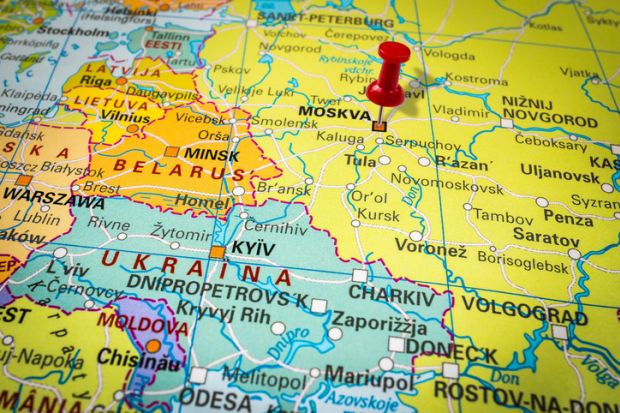Researchers based in former republics of the Soviet Union outside Russia have become highly engaged in international research collaboration, possibly to make up for a lack of domestic spending on research, an analysis indicates.
In 12 of 15 former Soviet-bloc nations, more than half the papers indexed in the Web of Science database since 1993 were co-authored with researchers abroad, compared with about a third in Russia.
The findings, by researchers at the University of Oxford and Russia’s HSE University, come from an analysis of more than 1 million papers published since the break-up of the Soviet Union.
Although more than three-quarters of the research over the period featured Russia-based authors, the data show a large percentage increase in the output of some former Soviet republics, especially the Baltic states that are now part of the European Union but also some central Eurasian countries such as Armenia.
“Unusually large proportions of the Web of Science publications from these countries are internationally co-authored,” said Maia Chankseliani, associate professor of comparative and international education at Oxford, who worked on the analysis with Andrey Lovakov and Vladimir Pislyakov at the HSE.
“The practice of international co-authorship is much more widespread in this region than globally, where only one in five publications is internationally co-authored.”
In Russia, meanwhile, international collaboration has been slower to pick up, although this could be explained in part by the country’s already having a large capacity for research and the availability of more “local” journals indexed in the Web of Science.
A large proportion of research output from some of the post-Soviet states – particularly Armenia and Georgia – was also part of international “mega collaborations” where papers had more than 20 authors.
This success in engaging in large research networks could be due in part to the need for researchers “to seek resources outside their countries, which offer limited R&D funding and institutional capacity”, said Dr Chankseliani, who presented the findings in a Centre for Global Higher Education webinar last month.
“Researchers from relatively resource-poor contexts may be working harder to tap into international research funding. In other words, they may be relying on the international rather than the national funding sources.”
Membership of the EU had also “contributed to the research capacity development” in the Baltic states, she said, including the fact that it gave them full access to European funding programmes.
“Due to the EU membership, the Baltic states also have access to more extensive knowledge exchange and capacity development opportunities when compared with other former Soviet countries,” Dr Chankseliani added.
However, she said, freedom of movement in the EU could have made it much easier for researchers from the Baltic to relocate “with negative implications for the research capacity within the region”.




